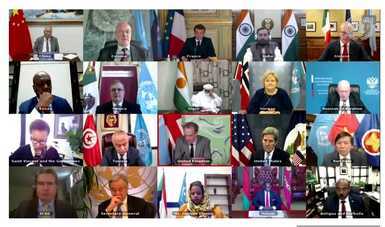- Secretary Ebrard reiterated the desire of the Government of Mexico to work together to find multidimensional and structural solutions to environmental issues, in order to build more egalitarian, sustainable and resilient societies.
- He said the Security Council should have risk analyses of specific cases available to it in order to be able to take preventive action or to avoid or mitigate humanitarian catastrophes.
Today the Secretary of Foreign Affairs, Marcelo Ebrard, took part in a high-level debate of the United Nations Security Council (UNSC) on “Climate Change: Addressing climate-related security risks to international peace and security through mitigation and resilience building," chaired by UK Prime Minister Boris Johnson.
In his remarks, the Foreign Secretary said the COVID-19 pandemic had revealed that international security can no longer be viewed through the single lens of traditional threats because the threats are multidimensional and linked to challenges of social and economic development. Food insecurity, water scarcity, droughts and floods can be exacerbated by climate change, with devastating effects and serious impacts on communities already immersed in conflicts, especially women in rural areas.
Therefore, he reiterated that climate change requires a response that emphasizes ecosystem preservation and support for mitigation and adaptation commitments. He said that, for Mexico, adaptation is a priority issue, noting the work done by the Global Commission on Adaptation to promote nature-based solutions, which can offer opportunities for recovery, resilience and investment. Prevention is a key part of Mexico's policy on comprehensive risk management, and implementation of the Sendai Framework should underpin and create synergies and coherence with the actions taken as part of the 2030 Agenda, the Addis Ababa Action Agenda, and other multilateral processes.
Foreign Secretary Ebrard commended the return of the United States to the Paris Agreement, and called for the upcoming conference on climate change, to be held in Glasgow, to achieve its objectives. Regarding the role of the Security Council with respect to climate change issues, he said the Council should have risk analyses of specific cases available to it in order to be able to identify—in a timely manner—situations in which climate change can have multiplying effects that affect international peace and security, and to take preventive actions to avoid or mitigate humanitarian catastrophes.
He said that the Council's creation of an informal group to monitor the links between climate change and security, and the analyses done by the collaboration mechanism of the Department of Political and Peacebuilding Affairs, are concrete measures that will strengthen the action mechanisms. He added that the current COVID-19 pandemic and its effects on the most fragile situations has shown how urgent it is to protect people and their livelihoods, and to ensure the construction of a sustainable peace.
Lastly, he reaffirmed Mexico's commitment to making the fight against climate change a priority for its international actions, and agreed with the UN Secretary-General that post-pandemic recovery efforts are an opportunity to "build back better" and to make a transformative change. Secretary Ebrard reiterated his desire to work together to find multidimensional and structural solutions to environmental issues, in order to build more egalitarian, sustainable and resilient societies.
